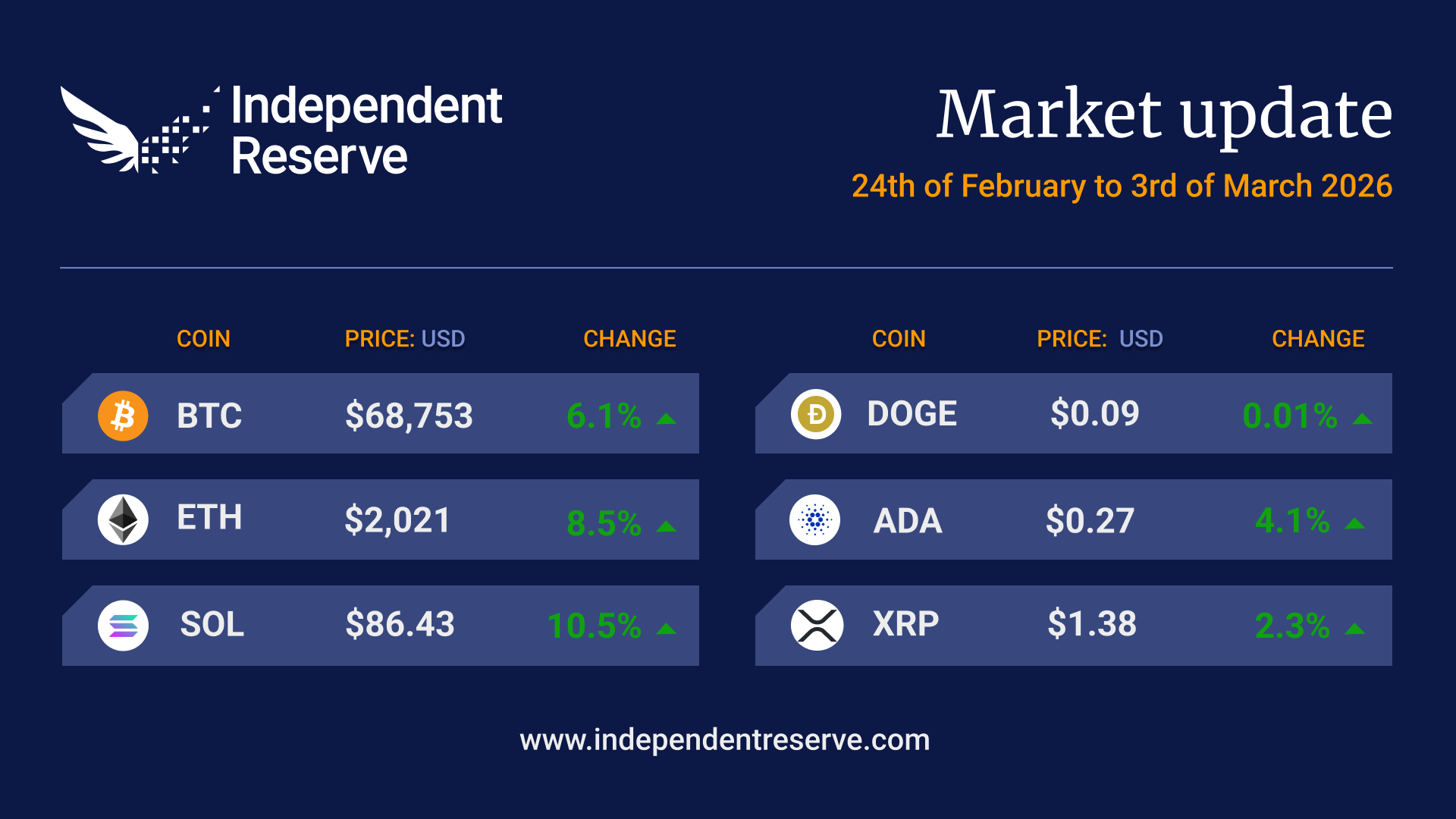In Markets
Although crypto markets appeared to take a brief hit from the acrimonious end of the bromance between Donald Trump and Elon Musk, Bitcoin surged overnight and is again nearing an all-time high, which was last broken 18 days ago when the price topped US$111,970 (A$169,685). The S&P 500 and Nasdaq are both near record territory, too, despite lingering inflation and trade war concerns. The US economy added 139,000 jobs in May, beating expectations – although JPMorgan’s David Kelly has a different interpretation and is warning of a slowdown.
In other positive developments, the SEC chair Paul Atkins has endorsed DeFi and US lawmakers are closing in on stablecoin legislation. However, the seven-day moving average of transactions on the Bitcoin network has fallen to a 19-month low and Bloomberg Intelligence analyst Mike McGlone points out gold has outperformed Bitcoin since December, surging 26%. The Crypto Fear and Greed Index is at 71, or Greed.
Please note, Independent Reserve will be down for scheduled maintenance on Sunday 15th June from 2pm AEST. We expect the outage to last approximately five hours.

In Headlines
US stablecoin legislation
In the U.S., the GENIUS stablecoin bill looks like it is heading to a vote this week, according to Senator Cynthia Lummis, with Democrats and Republicans agreeing on a set of amendments for a substitute version of the bill. Alex Thorn from Galaxy Digital says he expects the bill to hit President Trump’s desk before August. Meanwhile, the House Financial Services Committee is set to meet this week for a markup hearing on the CLARITY cryptocurrency market structure bill before potentially sending it to legislators.
Ethereum ETFs surge
The Ethereum ETFs notched up 15 straight days of inflows as of Friday, bringing in US$837.5M ($1.28B), which is roughly 25% of the US$3.32 billion (A$5.1B) in net inflows since the ETFs launched in July 2024. Overall, the ETFs have now seen seven straight weeks of net inflows. Ethereum futures open interest has also increased by 40% in the past month. The amount of staked ETH has also hit record highs, with 28% of the 120.7 million total supply staked. Bernstein analysts reported that real-world asset tokenisation and stablecoins underpin the network’s value. “Not all crypto tokens are valuable, but foundational blockchain native assets such as Ethereum are now crossing the chasm from useless retail speculation to useful financial innovation,” the analysts said. While Ethereum has turned a corner, the Bitcoin ETFs are breaking records with BlackRock’s IBIT becoming the fastest ETF to top US$70B (A$107B) AUM.

Hong Kong courts global investors with new crypto regulations
Hong Kong is positioning itself as a global crypto hub with two key regulatory moves. A new stablecoin law coming into effect on August 1 will require issuers to be licensed and backed by reserves — a step aimed at boosting confidence and attracting institutional and retail capital. Last year, global stablecoin trading volume hit US$27.6 trillion, surpassing the combined transactions of Visa and Mastercard. At the same time, the city plans to legalise crypto derivatives trading for professional investors. With derivatives already 5 times the size of spot trading and hitting US$21 trillion in Q1 alone, the move signals a bid to deepen market activity. China has also announced it will sell seized digital currencies through licensed Hong Kong exchanges, reinforcing the city’s growing role as a regulated bridge between traditional finance and digital assets.
Deutsche Bank stablecoin?
Deutsche Bank issued a report last month tipping 2025 will be the year stablecoins go mainstream, and it’s now weighing up whether to issue its own stablecoin or join a broader industry initiative. Sabih Behzad, the bank’s head of digital assets, also told Bloomberg the bank is looking at developing tokenised deposits to streamline transactions. “We can certainly see the momentum of stablecoins along with a regulatory supportive environment, especially in the US,” Behzad said.
Singapore’s MAS sets deadline for crypto firms to meet licensing requirements
The Monetary Authority of Singapore (MAS) has announced that from June 30, digital token service providers offering services solely to overseas clients must obtain a licence under the Financial Services and Markets Act 2022. MAS said it has set a “high bar” for licensing to safeguard Singapore’s reputation, citing heightened risks of money laundering and terrorism financing due to the cross-border, internet-based nature of these businesses. Providers that cannot meet the requirements must cease such services by the deadline. MAS also clarified that existing licensed providers serving Singapore-based clients are not affected, and that services involving utility or governance tokens are excluded from these new rules.
Crypto funds under management record all-time high
Morningstar data from 294 crypto funds shows a record US$167 billion in assets under management in May, driven by US$7.05 billion in net inflows amid growing use of digital assets as a hedge against market volatility. Analysts view this trend as continuing crypto’s integration into mainstream diversified portfolios, following the approval of spot bitcoin and ether ETFs.

Strategy quadruples new share offering
Michael Saylor’s Strategy has supersized its US$250 million (A$383M) STRD preferred share offering to US$1 billion (A$1.5B). It will use the money raised for “general corporate purposes, including the acquisition of Bitcoin and for working capital.” Its Japanese equivalent, Metaplanet, has also revised its plan to buy 21,000 Bitcoin in 2026 upwards to 100,000 Bitcoin. Metaplanet currently holds 8,888 BTC.
Circle’s blockbuster IPO
USDC stablecoin issuer Circle debuted strongly on the New York Stock Exchange, tripling its offer price of US$31 (A$47.5) and valuing the company at US$30.5 billion (A$46.8B) on a fully diluted basis. The strength of the listing suggested to analysts the wider IPO market is regaining momentum after being stifled by tariff driven uncertainty. “This is big enough that it extends beyond crypto,” said Matt Kennedy, senior strategist at Renaissance Capital.

SEC chair favours self-custody
The new chair of the U.S. Securities and Exchange Commission, Paul Atkins, has described crypto self-custody as a “foundational American value” in his opening remarks to a crypto roundtable. Atkins said he has directed SEC staff to create rules that help issuers and intermediaries that want to administer on-chain financial systems, including the creation of an innovation exemption that could help fulfil “President Trump’s vision to make America the ‘crypto capital of the planet’ by encouraging developers, entrepreneurs, and other firms willing to comply with certain conditions to innovate with on-chain technologies in the United States.”
Year of living dangerously
According to Galaxy Digital research analyst Alex Thorn, 2025 is shaping up as the most dangerous year on record for physical attacks against crypto owners. “More than 25 documented physical attacks against crypto owners this year, and the year isn’t even half way done,” he posted. The most high-profile case saw Ledger cofounder David Balland abducted in France.
Inspired by the attacks to upgrade security, the “Bitcoin Family” (a Dutch family who sold everything they had to go all in on Bitcoin and travel the world) are storing parts of their seed phrase on metal plates hidden across four continents. “We have changed everything. Even if someone held me at gunpoint, I can’t give them more than what’s on my wallet on my phone,” Didi Taihuttu told CNBC. For ordinary crypto holders, the best security measure is simply not revealing your crypto holdings publicly.
Until next week, happy trading!


